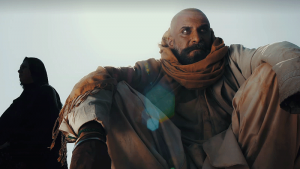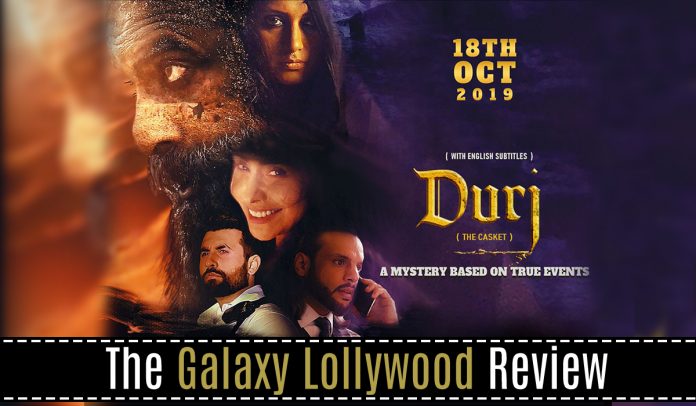The Plot
The plot is fairly simple. Farah (played by a rather miscast Maira Khan) abducts a prisoner named Gul Buksh (played by a very impressive Shamoon Abbasi) because she believes that he can lead her to her missing husband. We are then taken on a journey through some of Gul Buksh’s life’s events, which includes his indulgence in cannibalism and his relationship with Laali (played by a dependable Sherry Shah).
 There are a lot of questions I had about the characters that were left unanswered, a red flag indicating that the script is not the film’s strongest points. The movie never explores Gul Buksh’s obsession with, or his initiation into cannibalism in any detail – did it come to him easily or was it a habit he grew accustomed to more gradually? We are given a very short backstory about his parents, however, there is little by way of exploring psychological complexities behind resorting to something as outrageous as cannibalism. After a point, though, this did not bother me.
There are a lot of questions I had about the characters that were left unanswered, a red flag indicating that the script is not the film’s strongest points. The movie never explores Gul Buksh’s obsession with, or his initiation into cannibalism in any detail – did it come to him easily or was it a habit he grew accustomed to more gradually? We are given a very short backstory about his parents, however, there is little by way of exploring psychological complexities behind resorting to something as outrageous as cannibalism. After a point, though, this did not bother me.
I realized that Durj is not the kind of film that would answer these questions – it certainly was not made out to be a documentary on cannibals. The plot here is pretty simple and for the most part, cannibalism is only superficially explored. However, this was something I was able to overlook quite early on, mostly because there is more that the film offers.
The world of Durj
Although the audience is not able to explore it fully, there is a certain trance-like quality about the world that Gul Buksh and Laali inhabit. It is in creating this world that the makers succeed the most. The way in which the portions where these two characters share the screen are shot, coupled with the use of background music, allow for a satisfying cinematic experience. Even when the events depicted on screen are disturbing and uncomfortable to watch, you cannot take your eyes away from the film.
 The use of close-up shots, overhead shots, and slow-motion shots, along with the sound design and use of colors, creates the right eerie atmosphere that works well for the film in its flashback portions. In particular, the scene when Gul Buksh begins excavating the ground to get to a body – the first time we see him indulge in cannibalism – is incredibly unsettling, but also adds meaning to the scenes building up to it. At moments such as these, you don’t quite want to look at the screen, but you cannot look away either.
The use of close-up shots, overhead shots, and slow-motion shots, along with the sound design and use of colors, creates the right eerie atmosphere that works well for the film in its flashback portions. In particular, the scene when Gul Buksh begins excavating the ground to get to a body – the first time we see him indulge in cannibalism – is incredibly unsettling, but also adds meaning to the scenes building up to it. At moments such as these, you don’t quite want to look at the screen, but you cannot look away either.
What did not work
While Shamoon Abbasi shines as an actor (more on that later), he disappoints as a writer and director. The loopholes in the script can be overlooked (and there are plenty), but the screenplay is also weak and jumps between different points in its timeline constantly.
The pace also slackens in the latter half and the writers waste screen-time on things that do not matter — they could have utilized this time to develop characters other than Gul Buksh. The track with Maira Khan, for one, is never allowed to expand beyond anything more than a plot convenience. She is constantly seen in despair but we don’t feel for her, nor do we sympathize with her struggles. It seems as if both she and the supporting actors needed better direction. There are scenes with junior police officers where they ham through their lines, making me wonder if they were given any brief by the director at all. Had the film been helmed by a more seasoned crew, the quality of the final product would likely have improved drastically.
The editing, too, is very weak – scenes are explored from different angles, which is great, but the cuts at times are too abrupt. The subtitles too contained typos galore, and coupled with the poor editing took away from the viewing experience.
The Performances
What Shamoon Abbasi does get right is his own performance as Gul Buksh. The seasoned performer gets into the skin of his character and delivers unsettling dialogues with such conviction that what the viewer actually gets to witness is Gul Buksh, the character, and not Shamoom Abbasi, the actor. Shamoon manages to emote quite effectively with his eyes and body language, and special mention should also be given to the team in charge of his look. This film was a Gul Buksh show all the way, though Sherry Shah as Laali did manage to hold her own, too. She owns the scenes that she is in and acts without any inhibitions.
The rest of the actors, though, are weak, and it seems as if they were not given much of a direction to work with. Maira Khan, having a decent amount of screen-time, has the bigger task of being our link to the world of Gul Buksh. It is through her character that Gul Buksh paints the world he comes from, and it is through Maira Khan, again, that we get to articulate our own disgust over Gul Buksh’s system of beliefs.
Unfortunately, Maira Khan acts as a weak liaison. While any comparisons to Silence of the Lambs would be completely unjust, it is worth mentioning here that the chemistry between Maira Khan and Shamoon Abbasi does not spark the same energy as that between Jodie Foster and Anthony Hopkins in the Jonathan Demme directed film.
The essence of Durj lies in the portions with Gul Buksh and Laali. Once you walk out of the cinema halls and let it all sink in, the scenes with the two are the ones you remember. Had these portions not worked, the film would have been a complete washout, but because they disturb you and shake you to your core, the film succeeds in doing what it set out to do. And, thankfully, what the film does not set out to do is glorify, or even try to normalize, cannibalism. While it is true that we are transported to a world in which we come across cannibals who throw heavy and thought-provoking dialogues at us, at no point is cannibalism being advocated for.
Verdict
With strong performances from the main cast, Durj marks the foray of a mainstream contemporary Pakistani filmmaker into the psychological thriller territory and is a step in the right direction. However, poor editing, weak screenplay and shabby direction do take away from its quality.
Rating 2.5/5 stars





